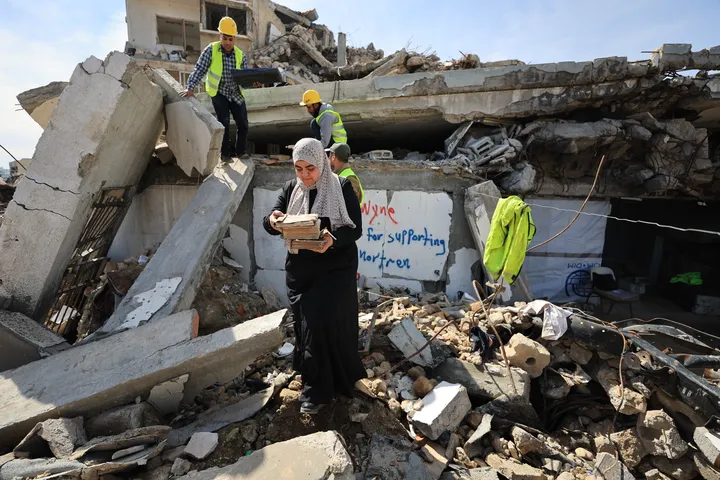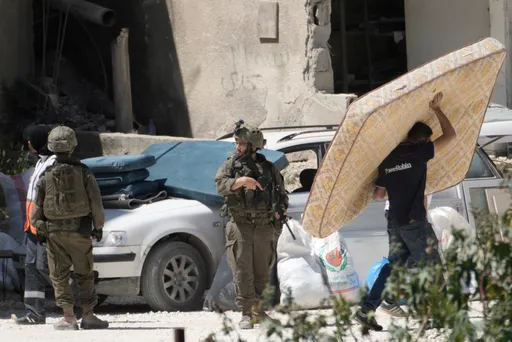In the wake of a ceasefire between Israel and Hamas after nearly 15 months of war, Israeli forces have shifted their focus to the occupied Palestinian land, the West Bank.
The Israeli military’s so-called Iron Wall offensive in Jenin from January 21 – just two days after the ceasefire announcement – has already claimed over ten Palestinian lives, including a child, and forced numerous civilians to evacuate their homes in the refugee camp.
Though the ‘Iron Wall’ aggression suggests a new military action, in reality, it is a chilling revival of a strategy to occupy Palestinian land, steeped in historical and political precedences.
The offensive echoes the tactics Israel has used for decades to entrench its control over Palestinian lands, often at the cost of Palestinian lives and human rights.
The long-awaited ceasefire came into effect on January 19, pausing a devastating 15-month war in the Palestinian enclave, after killing at least 47,161 Palestinians.
The origins
The ideology behind the Iron Wall can be traced back to the period between 1918 and 1920 when Zionist leaders put forward a maximalist interpretation of the Balfour Declaration.
Their goal was to gain international recognition for the Jewish claim to Palestine and to establish a Jewish national state that would extend across both banks of the Jordan River.
"To make Palestine as Jewish as England is English," Chaim Weizmann, a leading figure in the Zionist movement, famously stated at the Paris Peace Conference.
Zeev Jabotinsky, the father of the Iron Wall concept, took a direct approach, arguing for a military strategy to establish Jewish control over Palestine. He aimed to "erect an Iron Wall of Jewish military force" to crush Palestinian resistance.
In the 1920s, Jabotinsky argued that the establishment of a Jewish state in Palestine required the creation of an "Iron Wall"—a powerful military force that would crush Palestinian resistance and force the Arab population to eventually accept Israeli rule.
Jabotinsky’s stance was clear: the establishment of a Jewish national home in Palestine could only be achieved through military dominance, and such a strategy would eventually force Arab leaders to come to the negotiating table when they were ready to accept the reality of the Jewish state.
A political baggage?
In the present day, Israel’s Iron Wall offensive in Jenin reflects a continuation of these early Zionist ideas.
Israeli Defence Minister Israel Katz confirmed that this offensive marks a shift in Israel’s military approach to the occupied West Bank, drawing from “the first lesson from the method of repeated raids in Gaza”.
Reports suggest that the Iron Wall offensive was not just a military action, but a politically motivated move as well.
Prime Minister Benjamin Netanyahu is said to have launched the attacks to appease his far-right allies, particularly Finance Minister Bezalel Smotrich, who had threatened to pull down the coalition government over Israel’s ceasefire agreement with Hamas.
Smotrich previously said that he considered the ceasefire a defeat for Israel and pushed for further military action against Palestinians.
According to Israeli media, the offensive's stated objectives are to “preserve the IDF’s freedom of action” in the occupied West Bank, dismantle resistance infrastructure, and eliminate what Israel calls “imminent threats”.
Sources indicate that the offensive is expected to last several days.
Prime Minister Netanyahu, accused of genocide at the ICJ and with an arrest warrant issued, framed the offensive as “another step in achieving the goal we set, strengthening security in Judea and Samaria”—the biblical name for the West Bank.
In a statement, Netanyahu further emphasised Israel’s ongoing military assaults against what he described as the “Iranian axis”.
“We are operating in a systematic and decisive way against the Iranian axis wherever it sends its arms—in Gaza, Lebanon, Syria, Yemen, and Judea and Samaria.”
Iron wall yesterday
The Iron Wall concept has continued to evolve over time. In 2021, Israel unveiled a high-tech underground 65 km barrier along its border with Gaza, designed to “counter Hamas’s tunnel-based attacks.”
The barrier, described as an “iron wall,” includes sensors, radar systems, and reinforced concrete walls, continuing the legacy of militarised security measures aimed at maintaining Israeli control.
Similarly, the 2004 Iron Wall offensive was a large-scale Israeli military assault aimed at weakening the Palestinian resistance groups in Gaza.























